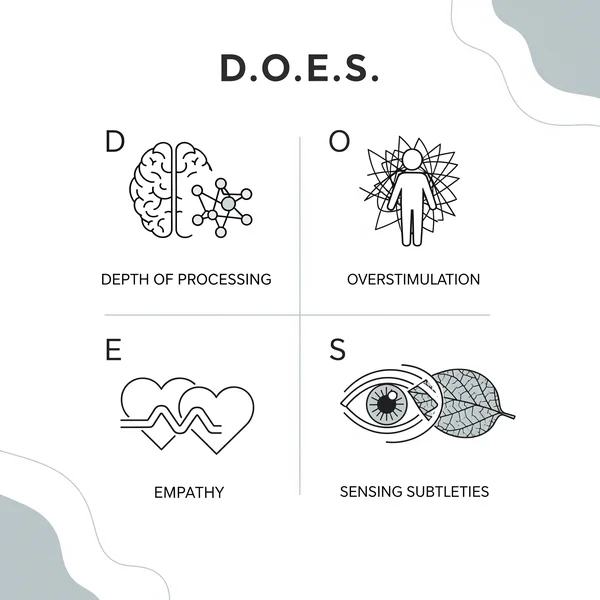什么是高度敏感者(HSP)?专家指南
July 6, 2025 | By Eleanor Reed
您是否觉得您比他人更能强烈地体验世界?或许您会被艺术深深打动,能够注意到他人忽略的细微环境变化,或者在嘈杂混乱的环境中容易感到不知所措。如果这听起来似曾相识,您可能已经接触过“高度敏感者”(Highly Sensitive Person)或 HSP 这个词。但 什么是高度敏感者呢? 这仅仅是情绪化,还是有更深层的原因?本指南将深入探讨这一常见性格特征背后的科学原理。如果您想知道自己是否属于其中,您可以通过 我们的 HSP 测试 来了解这个特征是否与您产生共鸣。

究竟什么是高度敏感者(HSP)?
高度敏感者(HSP)是指具有一种称为“感觉处理敏感性”(Sensory Processing Sensitivity, SPS)特定性格特征的个体。这并非一种障碍或缺陷;它是一种普遍存在、与生俱来的特质,在约 15-20% 的人群中可以找到。本质上,HSP 拥有神经系统对刺激的反应更为敏感,导致他们比其他人更深入地处理生理、情感和社会刺激。
这种高度的觉察意味着 HSP 常常能注意到他人忽略的细微之处,从雨水的淡淡气味到朋友语调的轻微变化。这种深度处理是 HSP 特质 的基石,并影响着 HSP 生活的方方面面。
起源:Elaine N. Aron 博士关于 HSP 特质的开创性研究
高度敏感者这一概念最早由心理学家兼研究员 Elaine N. Aron 博士于 20 世纪 90 年代提出。通过她广泛的研究,Aron 博士发现这种 敏感性 是一种独特且可衡量的 性格特质。她致力于将高度敏感从负面的标签(如“过于害羞”或“过于情绪化”)重新定义为一种中性的、具有优势和挑战的生物学特质。
Aron 的研究 为理解为何有些人更容易受到周围环境影响提供了科学框架。这并非个人选择或软弱的标志,而是其神经生物学的一个基本方面。
特质的核心:理解 D.O.E.S. 模型

为了让 HSP 特质 更易于理解,Aron 博士开发了 D.O.E.S. 模型,该模型概述了高度敏感者的四个核心特征。如果您强烈认同这四点,那么您很有可能是一位 HSP。
D - 深度处理(Depth of Processing)
这是基础要素。HSP 会更彻底地处理信息。在做决定时,他们会权衡所有可能的后果并反思过去的经历。他们拥有丰富的内心世界,常常思考生活中的“深刻问题”,从哲学到事件的意义。这种 深度处理 是他们经常提供深思熟虑的建议并拥有强烈直觉的原因。
O - 易受过度刺激(Overstimulation / Easily Overwhelmed)
由于他们会深入处理一切事物,HSP 比其他人更容易感到不知所措或过度刺激。繁忙的购物中心、响亮的音乐会,甚至忙碌的工作日都可能让他们精疲力竭。这种 过度刺激 是他们神经系统一次性接收过多信息所直接导致的后果。HSP 通常需要安静的休息时间来恢复精力。
E - 情绪反应与同理心(Emotional Reactivity & Empathy)
HSP 会深刻地感受情绪——无论是积极还是消极的。他们可能会在感人的电影中落泪,从美妙的音乐中感受到巨大的喜悦,或者对世界上的不公感到深切不安。这与高度的 同理心 相关;他们可以轻易地感知和体验他人的感受,几乎如同自己的情感一样。
S - 感知细微之处(Sensing the Subtle)
这指的是对环境中细微刺激的觉察。一位 HSP 可能是第一个注意到墙上新画作的人,是能尝出菜谱略微改变的味道的人,或是能捕捉到谈话中非语言线索的人。这种感知 细微刺激 的能力使他们感知力敏锐且富有直觉。
常见的误解:HSP 特质并非……
理解 HSP 是什么,也需要知道它不是什么。HSP 特质 经常与其他事物混淆,所以让我们澄清一些常见的误区。
不仅仅是“害羞”或“内向”
虽然约 70% 的 HSP 是内向者,但仍有 30% 是外向者。HSP 外向者享受社交互动,但他们可能仍会感到过度刺激,需要比非 HSP 外向者更多的休息时间。害羞是对他人评价的习得性恐惧,而高度 敏感性 是一种天生的处理世界的方式。
并非一种障碍或弱点
这也许是最重要的一点。高度敏感并非一种需要治愈的疾病。它未被列入 DSM-5(用于诊断精神健康状况的手册)。它是一种中性的 性格特质,就像任何特质一样,它也伴随着独特的优势。
区别于感觉处理障碍(SPD)
虽然两者都涉及感官信息,但它们并非相同。SPD 是一种神经系统障碍,导致大脑在接收和回应感官信息时出现困难,常常导致运动技能和日常功能方面的挑战。相比之下,SPS(HSP 的特质)是指更 深入地 处理感官信息,而非无序处理。
您是高度敏感者吗?如何找出答案
那么,我如何知道自己是否是 HSP 呢? 在阅读了 D.O.E.S. 模型和常见特征后,您可能开始在描述中看到自己的影子。
识别自己身上的迹象
回顾您的人生经历。您是否常常需要在忙碌一天后退到安静、黑暗的房间里?别人是否形容您“善于观察”或“认真负责”?您是否发现自己会被暴力或残忍的行为深深触动?这些都是潜在的 HSP 迹象。
在线进行免费、基于科学的 HSP 测试
探索这一特质最直接的方式是进行自我评估。Elaine Aron 博士开发了一个问卷,以帮助人们识别自己是否高度敏感。您可以通过进行一项 可靠的 HSP 自我测试 来进一步了解。这是一个简单、反思性的工具,旨在为您提供宝贵的见解。
拥抱您的敏感性,将其视为一种力量

理解 什么是高度敏感者 是开始拥抱这一特质作为您身份核心的第一步。您深入处理信息的能力、强大的同理心以及感知世界细微之处的能力并非弱点——它们是力量。它们使您成为一位富有同情心的朋友、一位有创意的思考者和一位富有直觉的个体。学会管理过度刺激,可以让您驾驭这些天赋并茁壮成长。
关于 HSP 的常见问题解答
成为高度敏感者是一种精神疾病吗?
不,绝对不是。高度敏感是一种普遍存在、与生俱来的性格特质,由 Elaine Aron 博士进行研究。它不是一种诊断,也未被列入任何诊断手册,如 DSM-5。
人口中有多少比例是 HSP?
科学研究估计,约 15-20% 的人口(甚至包括其他物种)拥有这种特质。它在所有性别中都同样普遍。
男性也会是高度敏感者吗?
是的。高度敏感在男性和女性中同样普遍。然而,文化期望常常使男性更难承认和拥抱自己的敏感性。
HSP 和内向者有什么区别?
尽管许多 HSP 是内向者,但 内向 是指通过独处获得能量,而高度敏感是指神经系统处理刺激的深度。约 30% 的 HSP 是外向者,他们享受社交,但仍可能需要休息时间来避免 过度刺激。如果您想了解自己的特质,一个很好的起点是进行一项 在线 HSP 性格测试。